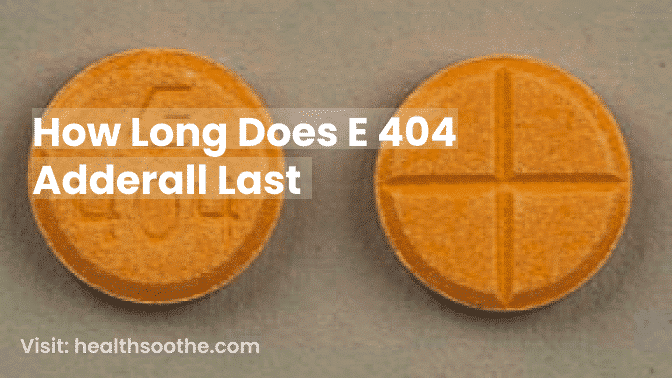Adderall can be detected in the body from 20 to 96 hours after the last usage, depending on the specific testing method employed.
Its presence is discernible in urine for a span of 72 to 96 hours after the last intake, in blood for a maximum of 46 hours, in saliva for a range of 20 to 50 hours, and within hair follicles for as long as 3 months.
Various factors, including urine pH, body weight, frequency of use, dosage, age, and time of last usage, influence the duration of detectability.
Despite being a prescription medication, Adderall is frequently misused, posing risks of addiction, overdose, and significant adverse effects such as cardiovascular problems, unhealthy weight reduction, and even psychotic symptoms.
Individuals who have developed an addiction to this drug could benefit from seeking professional treatment for substance abuse.
When utilized as prescribed, the effects of Adderall, which contains amphetamine and dextroamphetamine, typically endure for approximately 4 to 6 hours.
Conversely, Adderall XR's effects extend up to 12 hours due to its deliberate slow-release formulation, designed to distribute its contents gradually over an extended period (known as sustained release).
Certain medications have the potential to interact with Adderall, impacting its absorption rate, speed of excretion, and ultimately altering its duration within the body.
Medications that can hinder Adderall absorption, thereby diminishing blood levels and shortening its duration, encompass:
- Citrus juices like orange or cranberry juice
- Medications that heighten stomach acidity, like guanethidine and reserpine
- Vitamin C supplements (ascorbic acid).
Additionally, substances like KPhos, urinary acidifiers, ammonium chloride, or sodium acid phosphate can intensify Adderall excretion by acidifying urine, resulting in reduced blood levels and a decreased overall duration in the body.
Conversely, other medications or agents that render stomach contents more alkaline (less acidic) may amplify Adderall absorption, potentially affecting its duration within the body.
This impact is particularly notable for modified release versions such as Adderall XR, as these may experience accelerated disintegration of the modified release coating in an alkaline stomach environment. Medications that augment Adderall absorption and elevate blood levels encompass:
- Gastrointestinal alkalinizing agents, e.g., sodium bicarbonate
- Proton pump inhibitors (PPIs) such as omeprazole or pantoprazole.
Adderall functions as a stimulant medication, prescribed for addressing attention-deficit hyperactivity disorder (ADHD) and narcolepsy. Its composition encompasses a blend of amphetamine and dextroamphetamine.
Within the realm of branded pharmaceutical preparations, this amalgam of stimulants is found in Adderall (immediate release), Adderall XR (extended release), and Mydayis (extended release). The prompt-release variant of the medication is accessible in oral tablet configuration, whereas the extended-release variations are presented as capsules meant for oral consumption.
Read Also: How Long Does Naproxen Sodium Stay in Your System
How Long Does E 404 Adderall Last
The imprint "E 404" corresponds to a specific dosage of Adderall, which contains a combination of amphetamine and dextroamphetamine.
The duration of Adderall's effects can vary based on several factors, including the specific formulation (immediate release or extended release), an individual's metabolism, and other personal factors.
Generally, immediate-release Adderall lasts around 4 to 6 hours, while extended-release formulations like Adderall XR can last up to 12 hours.
However, individual responses may vary, and it's important to follow your healthcare provider's instructions and not exceed prescribed dosages.
If you have concerns about the duration of Adderall's effects or how it may interact with your body, it's best to consult your healthcare professional for personalized guidance.
Is Adderall Abused?
Adderall is frequently subject to misuse despite being legitimately prescribed to individuals diagnosed with ADHD or narcolepsy. Between the years 2016 and 2017, the count of individuals aged 12 and above engaging in Adderall misuse rose from 5.1 million to 5.2 million.
How Long Does Adderall Last In the Body?
The duration of Adderall's presence in the body varies. It is absorbed through the gastrointestinal tract and undergoes either liver deactivation or direct elimination through urine.
Approximately 20-25% of Adderall undergoes conversion into metabolites, which consist of substances like hippuric and benzoic acids.
The duration of time that Adderall remains detectable in an individual's system is influenced by various factors. One significant factor is the rate of elimination, which can be affected by the pH level of the person's urine.
Those with lower urine pH tend to eliminate the drug more quickly, while those with higher pH levels may have a slower elimination process.
Additional factors that impact the duration of Adderall's presence in the body include:
- Frequency of Adderall use.
- Dosage of Adderall taken.
- Time of the most recent Adderall usage.
- Body weight.
- Kidney or liver function.
Adderall & Drug Testing: Different entities, such as employers, law enforcement, medical professionals, mental health practitioners, and sports organizations, frequently employ drug tests to detect the presence of amphetamines, a component found in Adderall. Several testing methods are utilized:
- Urine test: The most commonly used method. Adderall is typically detectable in urine 72-96 hours after the last use.
- Hair test: Although less common, hair tests offer an extended detection window. Traces of amphetamines can be identified in hair for up to 3 months after the last use.
- Saliva test: Adderall can be detected in saliva for a span of 20-50 hours.
- Blood test: Adderall can be detected in the blood shortly after use, with traces remaining for up to 46 hours.
Side Effects of Snorting Adderall
Misusing Adderall, especially through methods like snorting, can lead to significant physical and mental side effects. These effects extend beyond the prescribed use of the medication and can include:
- Anger and hostility.
- Paranoia.
- Psychosis.
- Elevated body temperature.
- Irregular heartbeat.
- High blood pressure.
- Disrupted sleep patterns.
- Decreased appetite.
- Malnutrition.
- Seizures.
- Stroke.
Additionally, snorting Adderall can cause severe damage to the nasal passages, resulting in effects similar to those seen with snorting cocaine, including:
- Impaired sense of smell.
- Frequent nosebleeds.
- Nasal congestion and runny nose.
- Difficulty swallowing.
- Formation of nasal crusts.
- Persistent sinus inflammation and potential infections.
- Damage to the nasal septum (the partition between the nostrils).
It is crucial to recognize that misusing Adderall in any form, including snorting, poses serious health risks and can lead to a range of harmful consequences affecting both physical and mental well-being.


